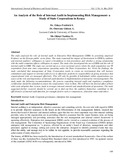| dc.contributor.author | Odoyo, Fredrick S | |
| dc.contributor.author | Omwono, Gideon A | |
| dc.contributor.author | Okinyi, Narkiso O | |
| dc.date.accessioned | 2015-03-09T06:31:59Z | |
| dc.date.available | 2015-03-09T06:31:59Z | |
| dc.date.issued | 2014-05 | |
| dc.identifier.citation | Odoyo Fredrick, S., Omwono Gideon, A & Okinyi Narkiso O (2014).An Analysis of the Role of Internal Audit in Implementing Risk Management-a Study of State Corporations in Kenya. International journal of business and social science, 5(6); pp.169-176. | en_US |
| dc.identifier.uri | http://ijbssnet.com/journals/vol_5_no_6_may_2014/18.pdf | |
| dc.identifier.uri | http://hdl.handle.net/11295/81029 | |
| dc.description.abstract | The study analyzed the role of internal audit in Enterprise Risk Management (ERM) by providing empir
ical
Evidence on the Kenyan public sector firms. The study examined
the impact of Involvement in ERM by auditors
and internal auditors’ willingness to report a breakdown in risk procedures and whether a strong rel
ationship
with the audit committee affects willingness to report. The study also investigated the use of ERM a
n
d the role of
internal audit in ERM. The study was carried out as a cross
-
sectional survey where the study population was 99
respondents from nine state corporations operating under the State Corporations Act. From the findin
gs, the
study concluded that ma
nagement of State Corporation needs to create an environment that will harness
commitment and support to internal audit if it is to effectively perform its responsibility of givin
g assurance that
organizational risks are managed effectively. This will only
be possible if individuals within organizations are
aware of the role and importance of internal audit function in implementation of enterprise risk man
agement. The
study made the following recommendations; the process regarding internal audit and regulat
ory compliance
certification should be amended to ensure the corporations’ trust in them. This will have the desire
d effect of their
wide
-
scale adoption that, in turn, leads to stronger internal controls and standardization of operations.
The study
suggest
ed further research should be carried out to find out how the auditors themselves contribute to the
effectiveness of internal audit function, for example factors such as competences, education status
and others | en_US |
| dc.language.iso | en | en_US |
| dc.publisher | University of Nairobi | en_US |
| dc.subject | Internal Audit, Corporate governan ce, enterprise risk management | en_US |
| dc.title | An Analysis of the Role of Internal Audit in Implementing Risk Management - a S tudy of State Corporations in Kenya | en_US |
| dc.type | Article | en_US |
| dc.type.material | en_US | en_US |

